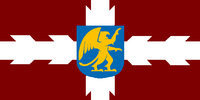History of Burgundie: Difference between revisions
mNo edit summary Tags: Mobile edit Mobile web edit Advanced mobile edit |
mNo edit summary Tags: Mobile edit Mobile web edit Advanced mobile edit |
||
| (8 intermediate revisions by the same user not shown) | |||
| Line 1: | Line 1: | ||
An abridged history of Burgundie. | An abridged history of Burgundie. | ||
== Contemporary period == | |||
[[Second Great War]]-present | |||
===21st Century Burgundie=== | |||
===The Second Burgoignesc Renaissance=== | |||
[[1982]]-[[2006]] | |||
===Operation Kipling and the Great Tumult=== | |||
{{Further|Operation Kipling}} | |||
[[1964]]-[[1982]] | |||
===Le Troisieme Intermezzo=== | |||
[[1943]]-[[1964]] | |||
===Second Great War=== | |||
{{Further|Second Great War}} | |||
([[1934]]-[[1943]]) | |||
== Late modern period == | == Late modern period == | ||
=== | ===L'Intermezzo Splendide=== | ||
The | The Splendid Interwar Period, ([[Burgoignesc language|Burg]]: ''le Intermezzo Splendide''), spanning [[1902]]-[[1934]] | ||
===First Great War === | |||
Main article: [[First Great War]] | |||
([[1896]]-[[1902]]) | |||
=== La Premier Intermezzo === | |||
[[1875]]-[[1896]] | |||
===First Fratricide=== | ===First Fratricide=== | ||
Main article: [[First Fratricide]] | Main article: [[First Fratricide]] | ||
| Line 13: | Line 36: | ||
[[File:BurgFaraFlag.png|200px|right]] | [[File:BurgFaraFlag.png|200px|right]] | ||
[[1853]]-[[1869]] | [[1853]]-[[1869]] | ||
===People's Spring in Maritime Dericania=== | |||
The People's Spring of 1848 rocked the nascent establishment to its core. The socialist, anti-monarchist rebellions seeking independent republics of Burgundie, Ultmar and Flordeterra. The wedding of Great Prince Pau II in January of 1848 was so opulent and extravagant that it starved and impoverished many of the poor across Burgundie. Grain stores were expropriated, taxes were raised even further, and many workers were pressed into service to throng the parade route. Unlike his martial and resourceful father Pau I, Pau II was raised to be gentil and refined by his mother Maria-Isabel de Martilles. He was spoiled and reactionary, often choosing to micromanage his problems, regardless of his ability to do so knowledgeably. He was set to become an absolute ruler and the pomp and circumstance that he demanded for his wedding demonstrated that fact. | |||
In the months after the wedding, the starving peasants across Burdeboch and Marves took up arms and raided government storehouses in search of food. The militias from the Isle of Burgundie and Marialanus, as well as the Gendarmes d'elite della Gaurdie Real (Elite Gendarmes of the Royal Guard) for the first time, were mobilized and violently suppressed the peasants. | |||
The | |||
== | ==Pre-unification history== | ||
*[[History of Dericania]] | |||
**[[Maritime Dericania]] | |||
**[[Burgoignesc colonial empire]] | |||
*[[Holy Levantine Empire]] | |||
**[[Crusades]] | |||
*[[Great Levantia]] | |||
*[[Ancient Istroyan civilization]] | |||
*[[Adonerum]] | |||
==See also== | ==See also== | ||
Latest revision as of 14:45, 6 April 2024
An abridged history of Burgundie.
Contemporary period
Second Great War-present
21st Century Burgundie
The Second Burgoignesc Renaissance
Operation Kipling and the Great Tumult
Le Troisieme Intermezzo
Second Great War
Late modern period
L'Intermezzo Splendide
The Splendid Interwar Period, (Burg: le Intermezzo Splendide), spanning 1902-1934
First Great War
Main article: First Great War (1896-1902)
La Premier Intermezzo
First Fratricide
Main article: First Fratricide 1849-1875
Burgundie-Faramount Union

People's Spring in Maritime Dericania
The People's Spring of 1848 rocked the nascent establishment to its core. The socialist, anti-monarchist rebellions seeking independent republics of Burgundie, Ultmar and Flordeterra. The wedding of Great Prince Pau II in January of 1848 was so opulent and extravagant that it starved and impoverished many of the poor across Burgundie. Grain stores were expropriated, taxes were raised even further, and many workers were pressed into service to throng the parade route. Unlike his martial and resourceful father Pau I, Pau II was raised to be gentil and refined by his mother Maria-Isabel de Martilles. He was spoiled and reactionary, often choosing to micromanage his problems, regardless of his ability to do so knowledgeably. He was set to become an absolute ruler and the pomp and circumstance that he demanded for his wedding demonstrated that fact.
In the months after the wedding, the starving peasants across Burdeboch and Marves took up arms and raided government storehouses in search of food. The militias from the Isle of Burgundie and Marialanus, as well as the Gendarmes d'elite della Gaurdie Real (Elite Gendarmes of the Royal Guard) for the first time, were mobilized and violently suppressed the peasants.